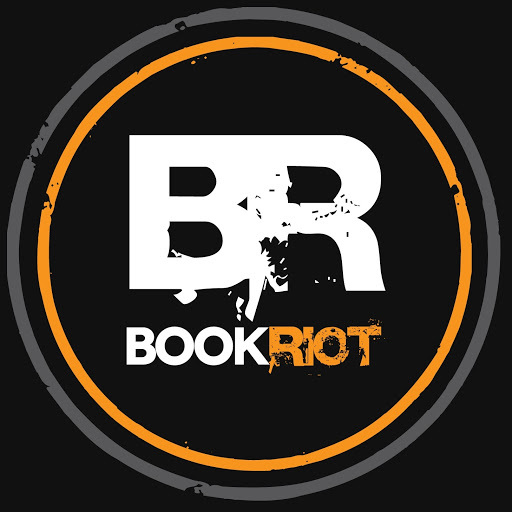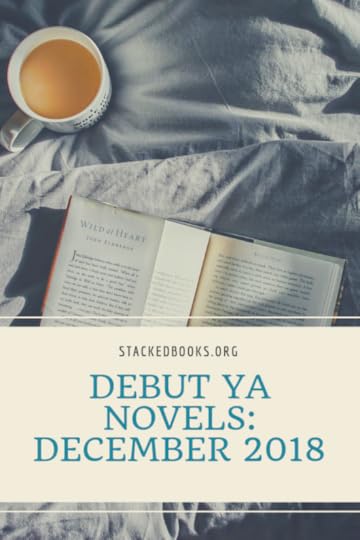Kelly Jensen's Blog, page 36
January 3, 2019
This Week at Book Riot & Elsewhere
Over on Book Riot this week…
7 tips for reading when you’re struggling with your mental health.
140+ new YA books hitting shelves between January and March. So much great reading!
Elsewhere…
I’ve made it a goal this year to expand where I’m writing a bit, and my first freelance pitch of the year was accepted at Bustle! I had a huge revelation while on book tour for (Don’t) Call Me Crazy this past fall about my own mental health journey, and I wanted to share it.
December 27, 2018
Top 10 Reads of 2018
My annual Goodreads goal is 100 books, which I normally hit with no problem. Alas, this year was an off year for me in terms of pure numbers. By the end of the day on December 31, I estimate I’ll have read 80 books total. Still, my 2018 reading year was full of really great stuff. Here, in no particular order, are the ten titles I loved best, the ones that most affected me and that I find myself recommending to friends, family, and library patrons over and over again.
Books for Teens
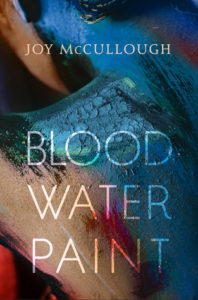 Blood Water Paint by Joy McCullough
Blood Water Paint by Joy McCulloughMcCullough’s debut novel is about Artemisia Gentileschi, a real painter from 17th century Rome who was raped as a teenager by a painter her father hired to tutor her. She chose to prosecute her rapist, participating in the trial – an even more rare and difficult thing then than it is now. The transcripts of the trial survive to this day. Blood Water Paint is mainly a verse novel, but McCullough skillfully threads prose sections featuring Artemisia’s mother, who died when she was a small child, telling her the stories of Biblical heroines Susannah and and Judith throughout. The real Artemisia painted these two women many times, in ways that show their strength and autonomy rather than their victimhood or vulnerability. The technique is successful, placing Artemisia in a context where she believes she, too, can choose to embrace her power where she can find it.
The book is not all about the rape, though. It’s also about art, specifically painting, and about Rome in the 1600s and how women and girls navigated the limited paths available to them. Artemisia’s voice is young, sometimes naive, but never oblivious. She’s intelligent, angry, unsure, and enormously talented. McCullough never makes her too “modern;” she was really as remarkable as the book makes her out to be. McCullough’s verse is a just reflection of Artemisia’s artistic ability: technically excellent, expressive, and innovative. Readers who finish the book wondering what happened to Artemisia afterward will be happy to know that she lived a long time, that she continued to paint, and that her work hangs in museums all over the world.
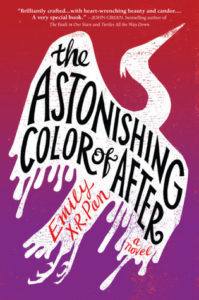 The Astonishing Color of After by Emily X. R. Pan
The Astonishing Color of After by Emily X. R. PanThis book is so good, it’s the only title that can be found on both my and Kelly’s lists. I loved Pan’s writing, which is so lovely and lyrical and literary without becoming so dense that it’s a struggle to read. Her protagonist Leigh’s story of grief, infused with magical realism amidst her search for family and identity, is beautifully drawn. This is a thick book that flies by, a good crossover pick for literary-minded teens who don’t normally read genre fiction and vice versa.
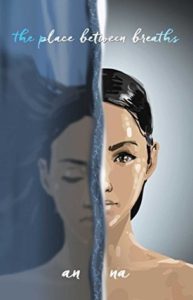 The Place Between Breaths by An Na
The Place Between Breaths by An NaAn Na’s book is an example of the idea that the shorter a novel is, the more difficult it can be to unpack. The Place Between Breaths has a lot in common with The Astonishing Color of After on the surface: it’s about a mother with mental illness who disappeared or died, and the daughter left behind to heal. Na’s protagonist, Grace, helps her father in his work at a lab that’s dedicated to finding a cure for schizophrenia, the illness that took her mother away from her. But the story is also about a lot more, and it’s told by Na in pieces, out of order, from contradictory perspectives that require the reader to re-read and puzzle things out. The book’s structure is meant to be a reflection of the illness itself, and while I don’t have any personal ties to anyone with schizophrenia (that I know of), the feedback I’ve received from readers who do have the disease is positive. This is a book for someone who likes a challenging read, one that will surprise them and move them in equal measure.
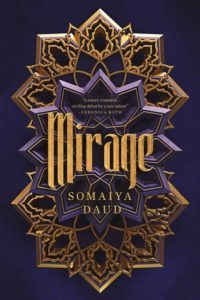 Mirage by Somaiya Daud
Mirage by Somaiya DaudI loved so much about this book: the irresistible hook (a girl from a conquered people is taken prisoner to be the body double of a hated princess), Daud’s lovely writing, the gradual deepening of the relationship between protagonist Amani and the princess Maram, the Moroccan-inspired setting in space and Amani’s people’s culture (clearly drawn from Daud’s own experiences but still unique to this story). It manages to be an exciting story that also tackles big themes of the evils of colonization and the possibility of redemption and change. And that cover is a stunner.
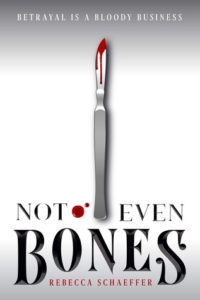 Not Even Bones by Rebecca Schaeffer
Not Even Bones by Rebecca SchaefferWhen it comes to horror, I’m much more likely to read books for teens than adults. I’m a bit squeamish (no horror movies for me at all!), and I find that YA horror novels usually have the right amount of scares for me. Rebecca Schaeffer did her best to prove me wrong – Not Even Bones is pretty gruesome, and it doesn’t shy away from describing in detail its setting of a market that sells body parts of unnaturals (humanoids with special abilities) and how those body parts are removed from and then used. The book is essentially an escape plot as our protagonist, Nita, finds herself imprisoned, awaiting sale in the market after freeing an unnatural her mother had planned to kill and sell for parts. I loved the relationship between Nita and her sometimes-ally Kovit, an unnatural who must eat human pain in order to survive. The plot is tense and exciting, with a fantastic twist near the end. Read my full review here.
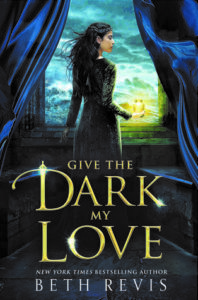 Give the Dark My Love by Beth Revis
Give the Dark My Love by Beth RevisRevis’ book, a fantasy about an alchemist-in-training named Nedra who desperately searches for a cure to a wasting plague that is decimating her homeland, is a meditation on grief, and it’s heartbreaking and tragic and beautiful. Her writing is gorgeously mournful, telling the story of a good person’s descent into darkness in the midst of almost unbearable pain. Good speculative fiction always functions as a metaphor for things that are real, and Give the Dark My Love is a prime example of this. We as readers follow Nedra’s journey from hardworking girl with a purpose into obsession and finally into a darkness from which she cannot return. All the while, she is propelled by something very real and very human that affects all of us. Revis’ writing is such that we feel everything right alongside Nedra – and alongside Revis herself. Don’t skip reading her acknowledgments at the end. Read my full review here.
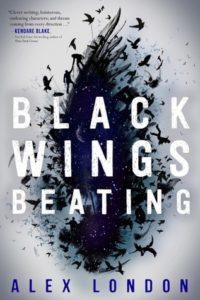 Black Wings Beating by Alex London
Black Wings Beating by Alex LondonI loved this fantasy about a culture that reveres falconry and birds of prey and the pair of twins caught up in a treacherous quest to capture the Ghost Eagle, the most majestic and valuable bird of all. Their quest is fraught with many different dangers: a matriarchal society of Owl Mothers that live in the mountain they must traverse who want the twins for their own purposes; the de facto rulers of their town who threaten them with death if they fail in their quest; a warring sect of religious killers who intend harm upon anyone who worships the birds; and more. The relationship between the twins, a brother and sister who are very different from each other but are bonded by love and common experience, is well-wrought, as is the culture that has developed around the birds, whom readers will come to respect almost as much as the characters in the story. Read my full review here.
Books for Adults
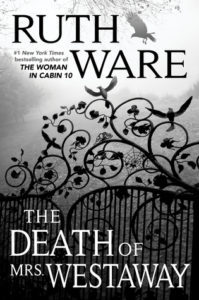 The Death of Mrs. Westaway by Ruth Ware
The Death of Mrs. Westaway by Ruth WareRuth Ware has published four books so far, and she’s yet to write a dud. Her mysteries are nail-biting thrillers with compelling characters and twists I almost never see coming. The Death of Mrs. Westaway, her most recent, might be my favorite of hers to date. It’s about a woman, Hal, who receives a letter in the mail stating that her grandmother has died, and she is to report to her grandmother’s house to learn what she’s inherited, along with her other relatives. The only problem is, Hal knows that she’s not the intended recipient of the letter; it’s an unfortunate mistake due to a mix-up with the names. But Hal is desperate, unable to make ends meet on her own, and decides to impersonate this other person and see if she can claim the money after all.
Ware’s latest requires a lot of careful thought on the part of the reader. One main plot point relies heavily on the way certain things are said by certain people, and judging from some of the Goodreads reviews, it threw a lot of readers for a loop, and they’re still trying to puzzle it out. But for the careful reader, one who is perhaps willing to flip back and analyze and try to figure things out on her own as she reads, this is a real treat. I recommend this for fans of intricately-plotted mysteries.
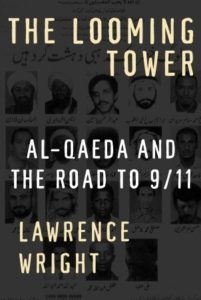 The Looming Tower by Lawrence Wright
The Looming Tower by Lawrence WrightLawrence Wright published this in 2006, five years after the September 11, 2001 attacks on the United States. I was a teenager when the attacks happened and in college when the book was published; at the time, the whole event was so awful for me, I avoided most mentions of it for years aside from very surface-level mainstream news sources: brief reports on nightly news, headlines on CNN. But this is not a great way to learn about any topic with any sort of depth or nuance, particularly one so important and world-changing as 9/11. Seventeen years later, I found myself able and willing to read Wright’s book, the standard-bearer in scholarship on 9/11 and a very readable, challenging, and even fascinating book. I read this on audiobook, which Wright himself narrates, and he does a good job. I got the sense that he was telling me the story of 9/11 as he wrote it, as he discovered it, and it drives home just how much the United States government and its various intelligence agencies knew, how inadequate the attempts were to prevent such an attack (when the focus was on it at all), how much misinformation was spread afterward, and how catastrophic the United States’ response was. This should be required reading for all Americans.
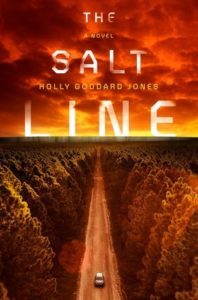 The Salt Line by Holly Goddard Jones
The Salt Line by Holly Goddard JonesEver since I read Station Eleven by Emily St. John Mandel, I’ve been on the hunt for a great literary sci-fi novel that matches it. While The Salt Line doesn’t quite measure up, it comes close. Jones is a master of the ensemble novel format. She gives multiple characters their own third-person points of view, engendering sympathy on the part of the reader even for those characters who are hard to like or commit detestable acts. She’s interested in the themes of parenthood or the lack thereof (motherhood most strongly, but fatherhood as well), as most of the characters’ motivations involve their children or their desire to not have children, as well as surrogate parent-child bonds. As someone who isn’t particularly interested in having children myself, I liked the focus Jones placed on one character’s decision to not have kids. This character’s reasons go beyond the stereotypical and dig into themes of sacrifice and how a person claims ownership of her life. It’s rare to find a book that treats lack of motherhood as an equally fulfilling avenue for its female characters.
December 23, 2018
12 Of My Favorite Books of 2018
I read an unbelievable amount of great books this year. As I begin brainstorming this post of favorites from 2018, I’m at nearly 200 books read. Engaging in audiobook listening, which I wrote about earlier this year, really added more reading to my life, especially in the way of adult nonfiction. Winnowing down my favorites from this year was a challenge because the more I read, the more I’m better able to only read books I suspect I’m going to like. At the end of the year, having enjoyed nearly 200 books? Makes picking just a few really tough.
My criteria for favorites isn’t scientific or brilliant. Rather, these are books that stood out to me for one reason or another and that I wanted to highlight as ones worth remembering as among my best reads. I’ve stuck to books published this year, since I could easily add dozens more when I look at backlist titles I read this year.
Along with audiobooks playing a significant part in my reading life this year, I’ve once again utilized the amazing spreadsheet one of my Book Riot colleagues created. This allowed me to really see the landscape of my reading life in new and useful ways. I don’t use every functionality it offers, choosing instead to customize and pay attention to the things that matter most to me. I also make a lot of notes in the final column, especially in regards to interesting aspects of a book that wouldn’t mean much in a review but could be useful for me in writing or recommending specific titles for readers.
Some of the notes below are ones I shared on Goodreads while others are fresh, reflective insights months after finishing the books. Some are longer, some are shorter, but all of these books are ones that I’ll remember as highlights from my 2018 year in reading.
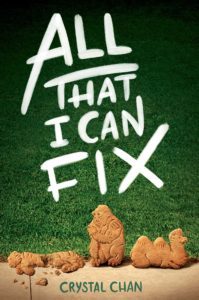 All That I Can Fix by Crystal Chan
All That I Can Fix by Crystal ChanRonney is 15, and he’s got a lot of baggage to carry around. While he loves his family — his little sister in particular — he’s utterly frustrated and angry with his father. His father attempted suicide two years ago, and since, everyone in the family has carried the weight of what they saw in the aftermath. Father doesn’t work and rarely leaves home. It looks like he’s not moving forward at all.
Then there’s Ronney’s best friends George and Jello. Turns out, even though Ronney has a little bit of a crush on George, she’s been secretly dating Jello. Both have been lying to Ronney about this.
And then there’s the kid who is stalking him. Begging for his jeans. What young kid follows you and begs for your jeans? It’s one of Mina’s friends, whose older brother went missing. Those jeans? They’re the product of his family sending everything of his brother’s to the resale shop. Ronney and the boy develop a bond, despite Ronney’s best efforts not to. The goal? Find Nick, the older brother, who had an alcohol problem and ran away from home to avoid an abusive father.
That’s not everything though.
A backyard zoo full of animals escaped during a major storm, and cheetahs, camels, pythons, and more are on the loose. Oh, and then the gun control advocates and gun rights advocates are in town, too. Each jockeying for stage during this animal outbreak.
In many ways, this book reminded me of John Corey Whaley’s Where Things Come Back. But the voice in this book is really what stands out. Ronney is full of love and compassion, but he’s also very angry and very hurt by those he cares most about. He’s young and carrying so much pain inside him that it’s impossible not to understand where his attitude and behaviors come from. But at the same time, it’s impossible not to want to shake him and tell him let go and move on.
What resonated most for me was the way this book looks at depression from the point of view of an outsiders. Ronney is angry with his dad and doesn’t understand why he doesn’t “do” anything. Why he tried to hurt his family. Meanwhile, in the moments when we see dad, we’re given insight into how hard he really is trying to be better. Even when he can’t be because his illness is in charge.
There is a lot of smart and at times snarky commentary about race, about small town life, and about the current political climate throughout the book, but it’s all written in a way a 15-year-old boy would look at those things. More, Ronney’s feelings about relationships and romance are all spot on, and they serve as a nice contrast to those big-picture challenges.
 The Astonishing Color of After by Emily XR Pan
The Astonishing Color of After by Emily XR PanThere is not a single thing in this book I did not love. The lush writing. The use of color. The exploration of family secrets and stories. Of culture. Or belief.
But the thing that hit hardest was the way depression is rendered. This is a book about grief in the wake of suicide that comes from a depressive episode (or series of them, in this instance). There is no “reason” here. There’s no boogeyman moment, wherein we get the why of suicide. Rather, we’re forced, like Leigh is, to wrestle with the lack of answers. We’re forced to understand not everything makes sense. That magical thinking is both a good thing — when it can help you work through grief, when it can help you find the things you’re looking for, the dreams you want to achieve — and a bad thing — when you believe what it is your brain tells you about your worth and value.
I’m going to hold on to this for a long, long time. One of the best YA books I’ve read this year, and certainly one of the best I’ve read in a long time. Perfect for fans of Nova Ren Suma or Laura Ruby. Our main character is a Taiwanese/Chinese American girl, and her story involves a trip to Taiwan to meet her grandparents for the first time.
But it is so, so much more than that.
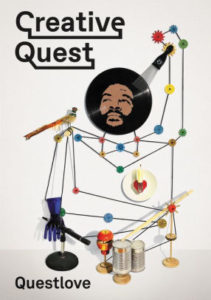 Creative Quest by Questlove
Creative Quest by QuestloveI listened to this title on audiobook after poring over it in a local Barnes & Noble. I didn’t buy it in print that day, choosing instead to pick up a few other books. But I used my audible credit to try it on audio and frankly, that was the better decision.
This is a book about creativity, and the way it was performed aurally was outstanding. It was a piece of art. It takes risks and chances, which is one of the key takeaways of the book. It’s okay to try and to fail and to try without any end goal in mind.
So what’s it about? It’s about the creative process. About how there’s no single way to get it right when it comes to being creative. It’s about the ways famous and less-famous creatives have worked, have thrived, and have had down times. It’s inspiring and heartening, and it’s the kind of book that actually encourages, rather than discourages, since there thrust of the book is that there’s no one way to get it right. Too many books about creativity and art focus on what works and how to work that way for maximum productivity. This one isn’t that — it’s about the ugly stuff, too.
I know little about Questlove, and that didn’t matter one bit. He shares pieces of his own experiences that makes his story universal, regardless of the level of success or talent towards which one may aim.
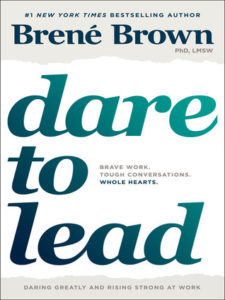 Dare To Lead by Brene Brown
Dare To Lead by Brene BrownBrown is one of the best thinkers on leadership and confidence, and this book is no different. There are strategies here for being a better person, for developing empathy (which is a wonderfully deep section in the book — a lengthy discussion of empathy vs. sympathy helps conceptually define the two ideas and showcases actions that define each). I’m a big believer that part of success comes from understanding people are people, and Brown’s big mantra throughout the book is “people, people, people.” Everyone has a story and everyone’s minds make up stories to help them get through the day. When we remember this simple thing, it becomes easier to be a leader and to be an advocate for what it is you want, what you need, and where you fit into the grander scheme of your life. Because this book isn’t about leadership in organizations only; sure that’s there. But it’s a book about being a leader in your life and showing up, day after day, for yourself.
Maybe my favorite of hers so far. It incorporates a lot of what research she did in previous books but adds even more depth to them. I also enjoyed being reminded to reconsider what my core values are and I’m itching to get into her worksheets to suss those out. We all operate from a set (and yes, SET) of core values and when we can remember them, we can show up for ourselves again and again.
Brown reads the audio and performs it less like a stiff reader and more like she’s giving a TED talk or having a conversation with a group of people in an organization. There are good breaks and laughs, and I just really like hearing these ideas and seeing what sticks from the verbal explanation. I’m eager to revisit this in a year or so in print and read it with pen in hand.
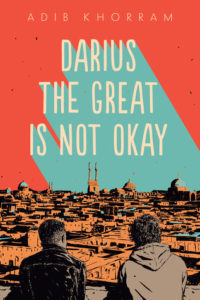 Darius The Great Is Not Okay by Adib Khorram
Darius The Great Is Not Okay by Adib KhorramPerhaps the closest novel I’ve read which captures my own feelings and experiences living with depression. But even more than that: this book is just freaking great.
Darius has always felt like the wrong piece of a puzzle. His dad is white and not like him at all. His mom is Iranian, but she’s fair skinned and doesn’t “look” Persian. Though he doesn’t look like his heritage, Darius is an outsider because people know he’s “not like them” in his Portland school. When his mother’s dad is nearing the end of his life, the family chooses to take a trip to Iran to reconnect. And it’s here where Darius really comes to understand he is an important piece of the puzzle in her family, in his community, and in the bigger world. Sohrab, the new friend-more-than-a-friend Darius makes in Iran, calls this what translates from Farsi into “your place was empty,” and that sentiment really resonated not only for Darius and his place in the world, but also, his place inside himself.
The relationship that develops between Darius and Sohrab is powerful and moving. It’s a best friendship, but it’s also something more. It’s not a physical romance, but there’s absolutely an emotionally romantic part of it for both of them, even if we only see it through Darius’s eyes. It was hard not to root for them through and through.
This book reminded me of a blend of Here to Stay and All That I Can Fix — two excellent books out this year that deal with race and culture, as well as feeling like an odd shaped puzzle piece (and ATICF also takes on mental illness and the way it can challenge a father/son relationship, while HTS has a similar flavor of humor as this title).
An outstanding read and unbelievable debut novel. Can’t wait for more from Khorram.
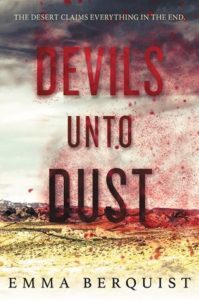 Devils Unto Dust by Emma Berquist
Devils Unto Dust by Emma BerquistThis book ticked every one of my boxes by description and then delivered on each.
Set in west Texas in 1877, the story follows Willie (real name: Daisy, but that’s too dainty for her) as she has to find her father, as he’s stolen a load of money from McAlister. McAlister promises revenge if that money is not returned.
The thing is: no one steps out of Glory alone. Outside of the gates are the shakes. The shakes are hungry, vicious, and will turn you into one of them in an instant. Willie has little money, but needs to hire herself a hunter to help her track down her father in another town. Enter the Garrett brothers.
Willie leaves behind her brother and twin brother and sister as she goes, but not for long. Micah can’t stand the idea of her venturing alone, even with the hunters, and he, along with neighbor Sam, catch up with the crew on the journey.
Enter the shakes.
Berquist’s first novel is the perfect blend of western and horror. The pitch “True Grit” meets “28 Days Later” is absolutely spot on. From page one, I was riveted and loved the entire arc of Willie’s story and character. The exploration of grief and guilt is thoughtful and thought-provoking, particularly as Willie sees herself to blame for a lot of the mess that occurs. Saying more would be a spoiler, of course.
The writing is pitch perfect, with descriptions of desolation in the desert palpable. Every minute I was not reading this, I was thinking about it and thinking about Willie.
Bonus: there is not a romance in this book. Sure, there’s a kinship that emerges between Sam and Willie at the end, but we know nothing more will be coming of it.
And then there’s what happens when they find Pa and ask him what happened to that money. And what happens when they return to Glory to face McAlister again.
Mega appeal to fans of westerns, of zombie stories, and to books that are fast paced and action-packed (but without making your head spin). The 500 pages speed by, and it’s a stand alone, perfectly contained read.
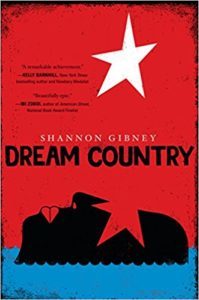 Dream Country by Shannon Gibney
Dream Country by Shannon GibneyThis is an incredible story of a family impacted by the African diaspora. The book is told in a non-linear fashion, as seen through the eyes of one of the contemporary members of the family. We begin in today’s Minneapolis area with a boy named Kollie, whose parents send him back to the land from where he was a refugee — Liberia. From there, we travel back to family that grew up in Liberia, then back even further to family which had been indentured servants in the US prior to the Civil War; their freedom came when they left the US and headed back to Liberia. We move, then, to the parents of Kollie and what they endured in Liberia.
What’s remarkable about this book, aside from the heartache and hope seen through the characters, is the history that we never learn about. Gibney’s extraordinary research (& powerful author’s note) explain how when black freed people went back to Liberia, they brought with them the same tools used against them to harm, enslave, and colonize the native Liberians. This book shows that through this family.
I couldn’t stop thinking about pairing this book with Homegoing. Like with Gyasi’s book, some characters will resonate more than others for readers; I found Kollie and Angel’s stories (especially her’s, despite being the smallest part — done purposefully) to be the most compelling. Note that some of the characters are a bit beyond their teen years, and in many ways, this book read to me as less YA and more adult. That doesn’t mean YA readers won’t love it, but rather, it’d be an awesome and easy sell to adult readers, too.
Powerful, moving, vital, and one that is going to mean a LOT to a lot of readers.
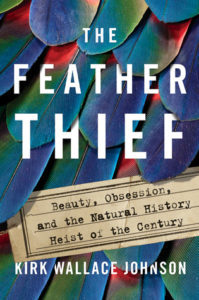 The Feather Thief by Kirk W. Johnson
The Feather Thief by Kirk W. JohnsonI loved every single second of this true crime book about a man who becomes so obsessed with fly-tying that he breaks into a museum to steal their rare birds to sell the feathers for profit. The premise of this sounds like it might be boring, but it’s anything but. Johnson’s attention to details and passion for cracking the mystery of the still-missing birds is propulsive, and the way this looks at a very specific community’s passion — in this case, the fly-tying community’s passion for very specific bird feathers — was fascinating. There’s a lot here, too, about ethics and about the ways people throughout history have sought what’s not theirs, starting with how those birds and feathers ended up in the British Museum of Natural History in the first place.
Highly recommended, especially for readers who want to love true crime but can get put off by blood, guts, and human death. None of that is here!
The images in this one, tucked near the back of the narrative, added a ton. I was surprised to see images of Edwin himself, who wasn’t at all what I expected (like Johnson himself had said just pages earlier), and seeing what these fly-ties looked like and the birds that drew such lust from those hobbyists made the crime all that more fascinating.
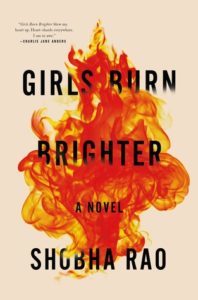 Girls Burn Brighter by Shobha Rao
Girls Burn Brighter by Shobha RaoI wrote about this one over on Book Riot’s Best Books of 2018!
This is about friendship: the fierce, fiery kind of friendship that exists between two girls who understand their place in the world as girls, their place in society as girls in India of a lower class, their place in society as girls who can only rely and depend upon one another. Savitha and Poornima only spend a small portion of the book together, but it’s the spark between them that keeps them connected through tragic event after tragic event.
What I loved most is what they carried of one another inside them. Poornima saw Savitha as the brave, self-assured girl, but in the end, Poornima pulls that same energy to find Savitha again, who has found herself in a situation not unlike the one Poornima was in during her marriage. Lost. Adrift. Alone.
Great writing and great voices really make this one sing. Not a YA book, but it likely has some great YA crossover appeal to readers eager for a book set primarily outside of America — it’s India for over half of the book — about female friendship.
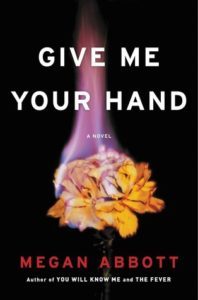 Give Me Your Hand by Megan Abbott
Give Me Your Hand by Megan AbbottSecrets go many, many ways, and Abbott explores this in her deliciously dark, twisted prose. Kit and Diane form a quick bond, but when Diane drops a bombshell secret on Kit, Kit distances herself. Until, that is, many years later, when Diane is back in her life. The two of them, once great lab partners and excellent science students in high school, earn prestigious places on a research project about PMDD with a renowned scholar.
Kit can’t be lured back in, but she is. The secret she knows still swirling inside her. The secret she knows that she’s not always kept secret, but that’s led to more secrets. The way secrets can spiral out of control, just like that. The way friendships sometimes turn toxic, but you’re too drawn in to turn away without consequences. Without a body count.
Two complex female leads, neither of whom are particularly “likable” nor “good,” Abbott’s prose sears and her storytelling is compulsively engaging. I’d have read this in a single sitting if I hadn’t had to do things like work.
Excellent crossover appeal for young adult readers and something that fans of Gillian Flynn will love.
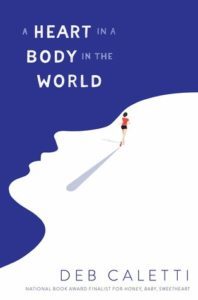 A Heart In A Body In The World by Deb Caletti
A Heart In A Body In The World by Deb Caletti*Spoiler on this one! But the spoiler is a big reason why this book resonated with me, so I’m keeping it there.
An all-too-timely feminist YA novel about the ways toxic masculinity harms each and every one of us. Annabelle has been victim of a controlling boy who believes she belongs to him and only him and she’s triggered in an incident months after his attack at a party. To clear her head and try to do something, she begins to run. And suddenly, she decides her goal is to run from Seattle to Washington, DC. She has no real plan but knows this is deeply what she needs and what she wants.
Along the way, Annabelle connects deeply with her grandfather, who follows along in an RV. She connects deeply with the country and the people populating it. There’s a fantastic scene in Marengo, Illinois, just minutes from where I live, and the love and heart there was so palpable.
This is a tough-to-read book because it’s too real. Caletti populates the book with such authentic, well-rounded characters, even the smallest ones throughout. It’s a book that girls today will relate to deeply and intensely. They shouldn’t have to.
As much as this is a book about tough things and real life and how awful the world is, it’s also a book complete with hope and humanity.
I just attended a Florence and the Machine concert, and one of the things Florence said during the show was that hope is an action. I couldn’t stop thinking about that line throughout this. Annabelle takes action on a physical, spiritual, and mental level. But her actions, as small as she feels they are (she doesn’t think her run is a big deal or anything special), have this massive ripple effect on the world around her. She takes back her power.
A great look at mental health, too, including anxiety and PTSD. There is no resolution. There is only working your way through, day by day.
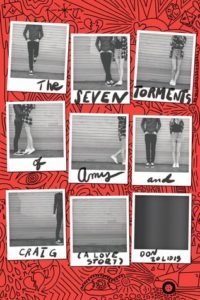 The Seven Torments of Amy and Craig by Don Zolidis
The Seven Torments of Amy and Craig by Don ZolidisThis is the epitome of the kind of love story I love in YA: there’s an ending that feels utterly deserved and that you’re told right away would happen (it’s not a romance with a capital R), and both of the characters have good and not-so-good qualities to them. Zolidis tells this story in a nonlinear fashion, taking us from the middle of Amy and Craig’s rocky relationship, then to the beginning, and then through to the end. We see both characters become well-fleshed, and we see their flaws in powerful ways.
Craig is funny, and throughout, his humor shines through. It doesn’t feel forced nor does it feel fake. This is a dude who really loves Amy but also knows he’s imperfect and immature and in a family that’s struggling financially, so some of his plans for the future are in question. Amy is adopted, and one of the through lines in the story is about her close relationship with her adoptive mother, as well as her toying with the idea of connecting with her birth mother.
The book is set in Janesville, Wisconsin, which is a community I’m really familiar with. It’s spot on in describing things and for hitting real great Wisconsin humor (the Perkins! The cow! Parker Pens and their layoffs! The GM plant!). It also is a love story to gaming and D&D, which began just a few miles down the road from Janesville and it also highlights Gen Con, back when Gen Con was still in Milwaukee (but after Lake Geneva, of course!). It was refreshing to see this all through Craig’s eyes, especially, because I knew so many people who grew up in Janesville not too many years after this story is set, and I know how much it rings true.
The dialog here is great, and both characters feel like actual teens. Zolidis writes plays for high school performers, and his eye for staging, for speech, and for mannerisms shines through.
Pass along to readers who like love stories told in non-linear ways, who love books with a funny male protagonist at the helm, and who like a book that makes them laugh and feel sadness throughout. It’s set in the 1990s, so it’s one that’ll appeal to readers who love that setting. It reminded me a big of A SHORT HISTORY OF THE GIRL NEXT DOOR, which would be a nice pairing. Readers who pick this up and love and/or are fascinated by the setting would do well with reading JANESVILLE, which highlights things like GM and the Parker Pen company and their role in building Janesville to being what it is; it’ll also give insight into the off-handed comments Craig makes, particularly about how Janesville is very white (it is, and that’s by racist design).
December 20, 2018
This Week at Book Riot
Lots to share from Book Riot this week!
I’ve worked nearly all year on the project that launched this week: The YA Adaptation Showdown. I invited seven amazing people from throughout the YA community to view a series of YA adaptations and advance one in their bracket to name a single title as the “best” YA adaptation — defining “best” in the best ways the judges could. Scroll to the bottom of the link above to start from the beginning. You can read about the judges and the bracket selection process in the introduction post.
An uncategorized list of 15 fun facts about your favorite tween/teen authors and books.
Check out these 16 awesome literary calendars to crush it in the new year.
Here’s a peek at the most popular bookish goods on Book Riot this year. I always find it fascinating what people are interested in, and this round-up has a little bit of everything!
December 18, 2018
2018: The Year of Time Travel
Was 2018 the year of time travel in YA? It certainly seems that way to me, based on the number of times I ran across one while reading reviews of new releases. I’m not one to complain – I’ve always loved the concept, and I think it’s such a great topic to mine for imaginative plots. In 2018, I counted 14 titles where time travel was the main plot driver, and I read a few of them myself for the Cybils award this year. Almost none of them were published by a big 5 publisher, which I think is interesting. Unfortunately, it’s not a very diverse list; here’s hoping 2019 will bring more diversity to the time travel theme.
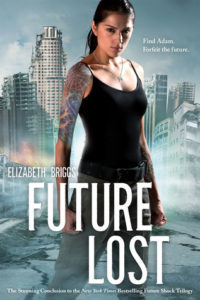 Future Lost by Elizabeth Briggs
Future Lost by Elizabeth BriggsIt’s been a year since Elena and Adam were first recruited by Aether Corporation and six months since they destroyed the accelerator, finally putting an end to Project Chronos and their involvement with Aether. Now they’re trying to move on with their lives. Elena’s in college and Adam is working on making genicote, his cure for cancer, safe for the public.
But genicote has become a dangerous fixation for Adam. He’ll do anything to figure it out, and when he goes missing, Elena realizes that he’s done the unthinkable: he went to Aether for help with the cure. To Elena’s horror, she discovers that Aether has created a new accelerator. Adam betrayed her trust and has traveled into the future to find the fix for his cure, but he didn’t come back when he was supposed to. Desperate to find him, Elena decides to risk future shock and time travels once more.
This future is nothing like they’ve seen before. Someone has weaponized Adam’s cure and created a dangerous pandemic, leading to the destruction of civilization. If Elena can’t find Adam and stop this, everyone is at risk. And someone will do anything to keep her from succeeding.
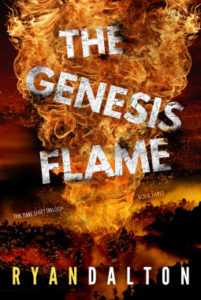 The Genesis Flame by Ryan Dalton
The Genesis Flame by Ryan DaltonThe timeline is burning. No one knows why.
Teenage twins Malcolm and Valentine Gilbert have defeated doomsday machines, ice monsters, and time-traveling supervillains. Yet their full potential remains out of reach. The Chrona is elusive, and without her guidance they struggle to grow in their abilities and to choose the course of their lives.
When an enemy invades from the future, he brands the twins as war criminals. Amidst a war between ages, the twins must uncover the real truth about themselves, their accuser, and the secrets that brought him to their town. At all costs, they must unlock their true power before the enemy breaks the timeline completely. If they fail, it could mean the end of Time itself.
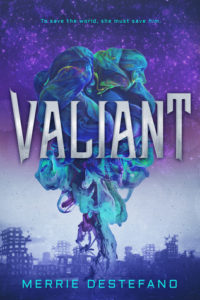 Valiant by Merrie Destefano
Valiant by Merrie DestefanoThe Valiant was supposed to save us. Instead, it triggered the end of the world.
Earth is in shambles. Everyone, even the poorest among us, invested in the Valiant’s space mining mission in the hopes we’d be saved from ourselves. But the second the ship leaves Earth’s atmosphere, our fate is sealed. The alien invasion begins. They pour into cities around the world through time portals, possessing humans, forcing us to kill one another.
And for whatever reason, my brother is their number one target.
Now the fate of the world lies in the hands of me, a seventeen-year-old girl, but with the help of my best friend, Justin―who’s suddenly starting to feel like more―maybe if we save my brother, we can save us all…
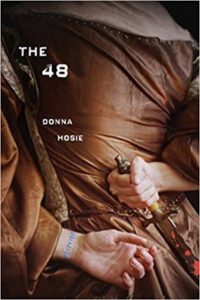 The 48 by Donna Hosie
The 48 by Donna HosieHenry VIII’s Tudor court meets time-traveling teen assassins in a riveting YA novel.
Twins Charlie and Alex Taylor are the newest time travelers recruited to the Forty-Eight, a clandestine military group in charge of manipulating history. The brothers arrive in 1536 feeling confident, but the Tudor court is not all banquets and merriment: it is a deep well of treachery, torture, lust, intrigue, and suspicion. The boys’ mission to prevent Henry VIII from marrying Jane Seymour is further complicated when Alice, a fellow trainee, appears under mysterious and brutal circumstances–and when whispers of an uprising within the Forty-Eight reach their ears. Told in alternating perspectives among Charlie, Alex, and sixteen-year-old Lady Margaret, a ladies’ maid to Queen Anne Boleyn with an agenda of her own, The 48 captures the sights, smells, sounds, and hazards of an unhinged Henry VIII’s court from the viewpoint of one person who lived that history–and two teens who have been sent to turn it upside down.
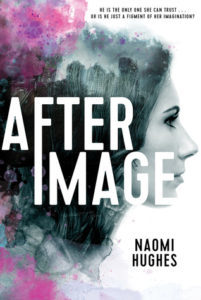 Afterimage by Naomi Hughes
Afterimage by Naomi HughesA horrific explosion levels part of the city and Camryn Kingfisher is the sole survivor.
Amidst controversy, conspiracy theories, and threats from government officials, Camryn longs for the truth. But the only person who she can turn to is a transparent boy in a lab coat named Quint. Unsure whether he’s a hallucination or a ghost, Camryn has no choice but to trust him as they become embroiled in a plot that is bigger than either of them realize.
In a race where the fabric of time and space is at stake, they must figure out who caused the explosion before the culprit comes back to finish Camryn―and her city―off for good.
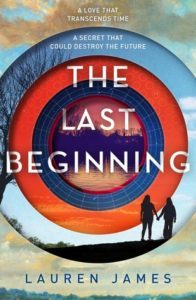 The Last Beginning by Lauren James
The Last Beginning by Lauren JamesSixteen years ago, after a scandal that rocked the world, teenagers Katherine and Matthew vanished without a trace. Now Clove Sutcliffe is determined to find her long lost relatives.
But where do you start looking for a couple who seem to have been reincarnated at every key moment in history? Who were Kate and Matt? Why were they born again and again? And who is the mysterious Ella, who keeps appearing at every turn in Clove’s investigation?
For Clove, there is a mystery to solve in the past and a love to find in the future, and failure could cost the world everything.
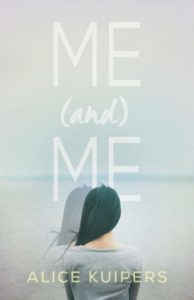 Me and Me by Alice Kuipers
Me and Me by Alice KuipersIt’s Lark’s seventeenth birthday, and although she’s hated to be reminded of the day ever since her mom’s death three years ago, it’s off to a great start. Lark has written a killer song to perform with her band, the weather is stunning and she’s got a date with gorgeous Alec. The two take a canoe out on the lake, and everything is perfect—until Lark hears the screams. Annabelle, a little girl she used to babysit, is drowning in the nearby reeds while Annabelle’s mom tries desperately to reach her. Lark and Alec are closer, and they both dive in. But Alec hits his head on a rock in the water and begins to flail.
Alec and Annabelle are drowning. And Lark can save only one of them.
Lark chooses, and in that moment her world splits into two distinct lives. She must live with the consequences of both choices. As Lark finds herself going down more than one path, she has to decide: Which life is the right one?
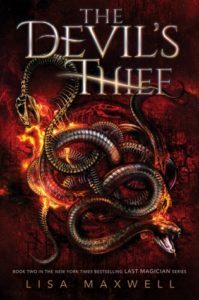 The Devil’s Thief by Lisa Maxwell
The Devil’s Thief by Lisa MaxwellEsta’s parents were murdered. Her life was stolen. And everything she knew about magic was a lie. She thought the Book of Mysteries held the key to freeing the Mageus from the Order’s grasp, but the danger within its pages was greater than she ever imagined.
Now the Book’s furious power lives inside Harte. If he can’t control it, it will rip apart the world to get its revenge, and it will use Esta to do it.
To bind the power, Esta and Harte must track down four elemental stones scattered across the continent. But the world outside the city is like nothing they expected. There are Mageus beyond the Brink not willing to live in the shadows—and the Order isn’t alone in its mission to crush them.
In St. Louis, the extravagant World’s Fair hides the first stone, but an old enemy is out for revenge and a new enemy is emerging. And back in New York, Viola and Jianyu must defeat a traitor in a city on the verge of chaos.
As past and future collide, time is running out to rewrite history—even for a time-traveling thief.
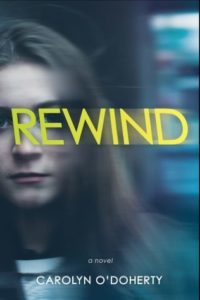 Rewind by Carolyn O’Doherty
Rewind by Carolyn O’DohertySixteen-year-old Alex is a Spinner–she has the ability to rewind time to review past events. Hated and feared because of their ability to find the truth, the small population of Spinners is restricted to Centers–compounds created to house and protect them. Alex’s society uses the Spinners’ skills to solve major crimes, but messing with time comes with consequences: no Spinner lives past the age of twenty. At sixteen, Alex is in her prime–until time sickness strikes early. When she is offered an experimental treatment, Alex sees a future for herself for the first time. But the promising medication offers more than just a cure–it also brings with it dire consequences.
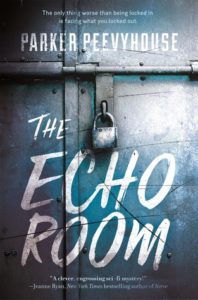 The Echo Room by Parker Peevyhouse
The Echo Room by Parker PeevyhouseRett wakes on the floor of a cold, dark room. He doesn’t know how he got there, only that he’s locked in. He’s not alone—a girl named Bryn is trapped in the room with him. When she finds a mysterious bloodstain and decides she doesn’t trust Rett, he tries to escape on his own—
Rett wakes on the floor of the same cold, dark room. He doesn’t trust Bryn, but he’ll have to work with her if he ever hopes to escape. They try to break out of the room—
Rett and Bryn hide in a cold, dark room. Safe from what’s outside.
But they’re not alone.
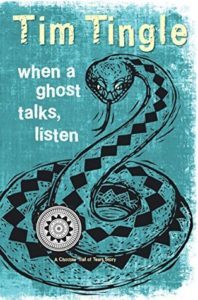 When a Ghost Talks, Listen by Tim Tingle
When a Ghost Talks, Listen by Tim TingleTen-year-old Isaac, now a ghost, continues with his people as they walk the Choctaw Trail of Tears headed to Indian Territory in what will one day become Oklahoma. There have been surprises aplenty on their trek, but now Isaac and his three Choctaw comrades learn they can time travel–making for an unexpected adventure. The foursome heads back in time to Washington, D.C., to bear witness for Choctaw Chief Pushmataha who has come to the nation’s capital at the invitation of Andrew Jackson.
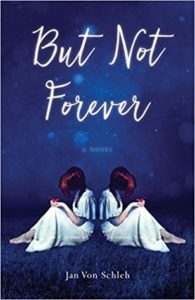 But Not Forever by Jan Von Schleh
But Not Forever by Jan Von SchlehCould she be everything you aren’t, but somehow―still be you?
It’s the year 2015 and Sonnet McKay is the daughter of a globe-trotting diplomat, home for the summer from her exotic life. Everything would be perfect if not for her stunning sister, whose bright star has left her in the shadows. In 1895, Emma Sweetwine is trapped in a Victorian mansion, dreaming of wings to fly her far from her mother, who gives her love to her sons, leaving nothing for her daughter. Fate puts them in the same house at the same moment, 120 years apart, and the identical fifteen-year-olds are switched in time. In their new worlds, Sonnet falls in love with a boy, Emma falls in love with a life, and astonishing family secrets are revealed. Torn, both girls want to still go home— but can either one give up what they now have?
But Not Forever is an enchanting story of love and longing, and the heart’s ultimate quest to find where it belongs.
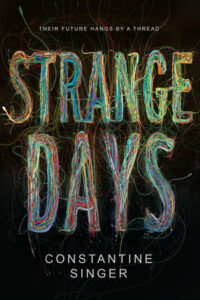 Strange Days by Constantine Singer
Strange Days by Constantine SingerAlex Mata doesn’t want to worry about rumors of alien incursions – he’d rather just skate and tag and play guitar. But when he comes home to find an alien has murdered his parents, he’s forced to confront a new reality: Aliens are real, his parents are dead, and nobody will believe him if he says what he saw. On the run, Alex finds himself led to the compound of tech guru Jeffrey Sabazios, the only public figure who stands firm in his belief that aliens are coming.
At Sabazios’ invitation, Alex becomes a “Witness”—one of a special group of teens gifted with an ability that could save the Earth: they can glide through time and witness futures. When a Witness sees a future it guarantees that it will happen the way it’s been seen, making their work humanity’s best hope for controlling what happens next and stopping the alien threat. Guided by Sabazios, befriended by his fellow time travelers, and maybe even falling in love, Alex begins to find a new home at the compound — until a rogue glide shows him the dangerous truth about his new situation.
Now in a race against time, Alex must make a terrible choice: save the people he loves or save the world instead.
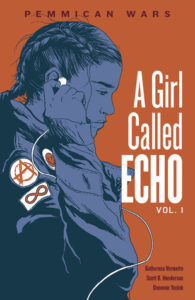 Pemmican Wars by Katherena Vermette
Pemmican Wars by Katherena VermetteEcho Desjardins, a 13-year-old Métis girl adjusting to a new home and school, is struggling with loneliness while separated from her mother. Then an ordinary day in Mr. Bee’s history class turns extraordinary, and Echo’s life will never be the same. During Mr. Bee’s lecture, Echo finds herself transported to another time and place—a bison hunt on the Saskatchewan prairie—and back again to the present. In the following weeks, Echo slips back and forth in time. She visits a Métis camp, travels the old fur-trade routes, and experiences the perilous and bygone era of the Pemmican Wars.
Pemmican Wars is the first graphic novel in a new series, A Girl Called Echo, by Governor General Award–winning writer, and author of Highwater Press’ The Seven Teaching Stories, Katherena Vermette.
Bonus: Forthcoming in 2019
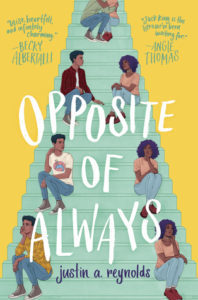 The Opposite of Always by Justin Reynolds
The Opposite of Always by Justin ReynoldsWhen Jack and Kate meet at a party, bonding until sunrise over their mutual love of Froot Loops and their favorite flicks, Jack knows he’s falling—hard. Soon she’s meeting his best friends, Jillian and Franny, and Kate wins them over as easily as she did Jack. Jack’s curse of almost is finally over.
But this love story is . . . complicated. It is an almost happily ever after. Because Kate dies. And their story should end there. Yet Kate’s death sends Jack back to the beginning, the moment they first meet, and Kate’s there again. Beautiful, radiant Kate. Healthy, happy, and charming as ever. Jack isn’t sure if he’s losing his mind. Still, if he has a chance to prevent Kate’s death, he’ll take it. Even if that means believing in time travel. However, Jack will learn that his actions are not without consequences. And when one choice turns deadly for someone else close to him, he has to figure out what he’s willing to do—and let go—to save the people he loves.
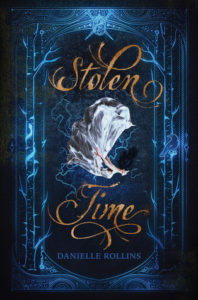 Stolen Time by Danielle Rollins
Stolen Time by Danielle RollinsSeattle, 1913 // Dorothy is trapped. Forced into an engagement to a wealthy man just so she and her mother can live comfortably for the rest of their days, she’ll do anything to escape. Including sneaking away from her wedding and bolting into the woods to disappear.
New Seattle, 2077 // Ash is on a mission. Rescue the professor—his mentor who figured out the secret to time travel—so together they can put things right in their devastated city. But searching for one man means endless jumps through time with no guarantee of success.
When Dorothy collides with Ash, she sees it as her chance to start fresh—she’ll stow away in his plane and begin a new life wherever they land. Then she wakes up in a future that’s been ripped apart by earthquakes and floods; where vicious gangs rule the submerged city streets and a small group of intrepid travelers from across time are fighting against the odds to return things to normal. What Dorothy doesn’t know is that she could hold the key to unraveling the past—and her arrival may spell Ash’s ultimate destruction.
December 16, 2018
December 2018 Debut YA Novels
It’s December debut YA novel time! With only three titles to share this month by debut authors, it’s a great month to catch up on previous titles published by first-time authors this year.
This round-up includes debut novels, where “debut” is in its purest definition. These are first-time books by first-time authors. I’m not including books by authors who are using or have used a pseudonym in the past or those who have written in other categories (adult, middle grade, etc.) in the past. Authors who have self-published are not included here either.
All descriptions are from Goodreads, unless otherwise noted; I’ve found Goodreads descriptions to offer better insight to what a book is about over WorldCat. If I’m missing any debuts that came out in December from traditional publishers — and I should clarify that indie/small presses are okay — let me know in the comments.
As always, not all noted titles included here are necessarily endorsements for those titles. List is arranged alphabetically by title, with publication dates in parentheses. Starred titles are the beginning of a new series.
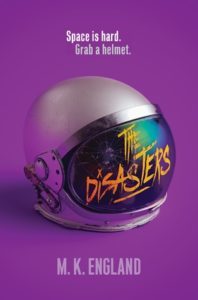 The Disasters by M. K. England
The Disasters by M. K. EnglandHotshot pilot Nax Hall has a history of making poor life choices. So it’s not exactly a surprise when he’s kicked out of the elite Ellis Station Academy in less than twenty-four hours.
But Nax’s one-way trip back to Earth is cut short when a terrorist group attacks the Academy. Nax and three other washouts escape—barely—but they’re also the sole witnesses to the biggest crime in the history of space colonization. And the perfect scapegoats.
On the run and framed for atrocities they didn’t commit, Nax and his fellow failures execute a dangerous heist to spread the truth about what happened at the Academy.
They may not be “Academy material,” and they may not get along, but they’re the only ones left to step up and fight.
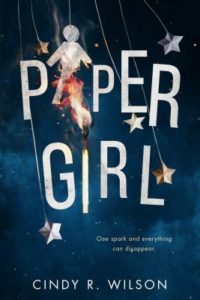 Paper Girl by Cindy R. Wilson
Paper Girl by Cindy R. WilsonI haven’t left my house in over a year. My doctor says it’s social anxiety, but I know the only things that are safe are made of paper. My room is paper. My world is paper. Everything outside is fire. All it would take is one spark for me to burst into flames. So I stay inside. Where nothing can touch me.
Then my mom hires a tutor. Jackson. This boy I had a crush on before the world became too terrifying to live in. Jackson’s life is the complete opposite of mine, and I can tell he’s got secrets of his own. But he makes me feel things. Makes me want to try again. Makes me want to be brave. I can almost taste the outside world. But so many things could go wrong, and all it takes is one spark for everything I love to disappear…
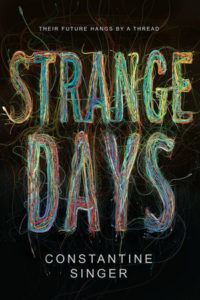 Strange Days by Constantine J. Singer
Strange Days by Constantine J. SingerAlex Mata doesn’t want to worry about rumors of alien incursions – he’d rather just skate and tag and play guitar. But when he comes home to find an alien has murdered his parents, he’s forced to confront a new reality: Aliens are real, his parents are dead, and nobody will believe him if he says what he saw. On the run, Alex finds himself led to the compound of tech guru Jeffrey Sabazios, the only public figure who stands firm in his belief that aliens are coming.
At Sabazios’ invitation, Alex becomes a “Witness”—one of a special group of teens gifted with an ability that could save the Earth: they can glide through time and witness futures. When a Witness sees a future it guarantees that it will happen the way it’s been seen, making their work humanity’s best hope for controlling what happens next and stopping the alien threat. Guided by Sabazios, befriended by his fellow time travelers, and maybe even falling in love, Alex begins to find a new home at the compound — until a rogue glide shows him the dangerous truth about his new situation.
Now in a race against time, Alex must make a terrible choice: save the people he loves or save the world instead.
Want to get a jump start on the debut YA novels hitting shelves in 2019? Here are two groups worth keeping an eye on. As always, these aren’t comprehensive lists of all the debut novels coming, but they can give you good insight into some books worth looking at each and every month next year.
Novel Nineteens — you can also follow their twitter chats with the hashtag #Novel19s
Class2K19
December 13, 2018
This Week at Book Riot
Over on Book Riot this week…
70+ badass literary cross stitch patterns. I’m planning on some crafting this winter, if that weren’t clear.
There’s a new episode of Hey YA this week, wherein Eric and I talk about the biggest YA news from this year, highlight some great YA memoirs, and then share some of our reading quirks. Tune in here.
December 11, 2018
Black Wings Beating by Alex London
 A great thing about being a panelist or judge for the Cybils award is that you end up reading and enjoying a lot of books you may not have picked up otherwise. Black Wings Beating by Alex London is one of them. It’s about falconry, which I can’t say is a topic that interests me normally, but it’s not really about falconry. It’s a unique fantasy with compelling narrators that does a lot of creative things in terms of both plot and world-building.
A great thing about being a panelist or judge for the Cybils award is that you end up reading and enjoying a lot of books you may not have picked up otherwise. Black Wings Beating by Alex London is one of them. It’s about falconry, which I can’t say is a topic that interests me normally, but it’s not really about falconry. It’s a unique fantasy with compelling narrators that does a lot of creative things in terms of both plot and world-building.
In the Six Villages in the country of Uztar, falconry is more than just a sport: the people revere the magnificent birds of prey, and a religion has even developed around their worship. The story is told in not-quite-alternating chapters by teenage twins Brysen and Kylee, who run a falconry business together since their father died a few years ago hunting the Ghost Eagle, a prized bird that would have brought wealth to the family. They don’t miss their father much; he routinely beat Brysen for not being an acceptable son, and Kylee feels insurmountable guilt for not being able to do enough to protect her brother. Kylee hopes to give up falconry once they make enough money; she’s gifted at the sport, but hates it. Brysen loves falconry, and while he has grown good from practice, his natural talent doesn’t match Kylee’s, which causes friction between the siblings.
When Brysen learns that his falconry teacher and sometimes-boyfriend has made a deal with the cruel de facto rulers of the town to capture the Ghost Eagle, Brysen decides to undertake the quest in his place in order to save his life. Kylee eventually follows, and the journey will take them deep into treacherous mountains where the most dangerous thing may not even be the Ghost Eagle itself.
The basic storyline (a quest to find something valuable) will be very familiar to fantasy readers, but the elements the twins encounter on the quest are what sets this book above much of its brethren. The mountain setting is vividly drawn, both its beauty and its hardships. A community of women called the Owl Mothers live within the mountains, and London’s depiction of this matriarchal society – neither traditionally “good” nor “bad” – is creative and thought-provoking. Along the journey, the twins find out more about the night their father died, and learn that each had been keeping secrets from the other. Their relationship is close but not stereotypically “we’re twins so we’re always on each other’s wavelength” close. During one particularly tense argument, London shows how these two people fiercely love each other even while intentionally hurting each other sometimes.
I loved the world London created, which provides many different conflicts that Brysen and Kylee have to tackle. Aside from the Ghost Eagle, the world itself provides additional conflict for the twins. In response to the religion that worships the birds (which their mother belongs to), another sect has arisen that views birds of prey as evil and their worshipers as people to be converted or killed. An occasional chapter is written from one of these people’s perspectives as he marches closer and closer to the Six Villages, intent on violence. Kylee’s natural talents with falconry are magic-based, and she runs into people who want to use her for their own ends. Others who want to capture the Ghost Eagle are on the hunt, too, and there are people within the mountain with nebulous motives who may also do the protagonists harm. London ratchets up the tension so well, I didn’t want to stop listening to the audiobook.
Brysen is gay and open about it, and there’s an interesting and sweet mini-romance between him and another boy they find on the mountain. Queer people seem to be the norm in the Six Villages, with the only prejudice against Brysen’s sexuality coming from his father (who never uses slurs, but indicates that Brysen isn’t “manly enough” when he beats him). There are indications that Kylee is asexual/aromantic, but I can’t be sure from context.
I was especially impressed by the way London wrote his ancillary characters. Brysen and Kylee are deftly characterized with two distinctive voices (expertly performed by Michael Crouch and Brittany Pressley), but so are all the minor characters: Brysen’s love interest, the leader of the Owl Mothers, even the sister of the ruling despot who shows up midway through the novel and has only a few lines. Since we meet everyone through either Brysen or Kylee’s point of view, our opinions of people shift and grow as their perspectives do. What once had seemed like a rescuer turns into a captor, and just when we’ve decided the captor is unredeemable, London provides another facet to them that makes us reassess yet again. Real people are like this, too: motivated by a variety of factors (both selfless and not) that are not apparent upon first acquaintance. This is a deep novel with deep characters and a story that will keep teens on the edge of their seats; the sequel can’t come fast enough.
December 6, 2018
This Week at Book Riot
This week over on Book Riot…
Over 40 YA books hitting shelves in paperback this winter.
The best book covers of 2018.
December 2, 2018
10 Conversation Starters About Books and Reading for Holiday Gatherings
It’s the season of holiday gathers, which often means making a lot of small talk with colleagues, with family, and maybe even with people you don’t know at all but have a shared relationship with (think: your friend’s friends). But even beyond the time of gathering, there can be times when making small talk becomes crucial. So why not have a few go-to questions prepared to get conversation rolling or to engage someone you’re interested in knowing better around a topic that you’re passionate about? Enter a guide to 10 conversation starters about books and reading.
I’ve sat through hundreds of panels in my time as a YA lover/librarian/writer, and I’ve also moderated a fair number. Those experiences, coupled with a life lived in books and around other readers, has allowed me a lot of time to think about the kinds of questions that are interesting to ask other people. These questions can get personal and deep, but they’re meant to spark thinking and discussion beyond the weather or one’s career.
These 10 questions about books and reading are a starting point. I’d love to know of any others you’ve used in the comments, and I’d also love to hear about the results if you do try any of these. I’ve found that I have learned so much from people, even those I thought I knew well, by asking some of these questions. The last question here is one that, if you’ve seen me moderate a panel, always comes up because I think the answers are fascinating and insightful.
10 Conversation Starters About Books and Reading
1. What is the first book you remember reading when you were young and have you ever reread it? Why do you think that particular book sticks out in your memory?
2. If you were stranded on an island and had only the books in your bag with you to keep you company for an uncertain amount of time, what three to five books would they be? Why?
3. Have you ever been part of a book club? If so, what did you like or dislike about it? If you haven’t — or if you’d like to join another one — what would your dream book club look like? How frequently would it happen? What kinds of books would you read? Would it be run by a celebrity and if so, who?
4. If you could host a dinner party with any three authors from any time in history, who would they be and why? Alternately, which three living authors would you want at your dinner party?
5. What genre of book do you find most difficult to read? What genre do you gravitate toward?
6. Do you listen to audiobooks? Why or why not? If you do listen to them, what are your favorite kinds of books to listen to and do you have a preference on narrator? On listening speed? If you don’t listen to them, what might interest you in trying one?
7. What is your favorite memory related to a library? If you don’t have one, talk about why that might be. Alternately, what teacher introduced you to some of your favorite books or read a book to you that you remember?
8. If you could switch places with any author for a year, who would it be and why? (Assume you’d have all of their abilities, so you’d be doing the work they’re doing at their level!).
9. Imagine you’re put in charge of a publishing imprint and get to decide the kinds of books you’d edit and publish every year. Or, alternately, you’re able to purchase the books for one category at your library or favorite bookstore. What kinds of books would they be and why? Is there any person, writer or not, you’d want to publish a book or purchase a book from?
10. If you could go back in time and give your 12-year-old self any book, what would it be and why?

